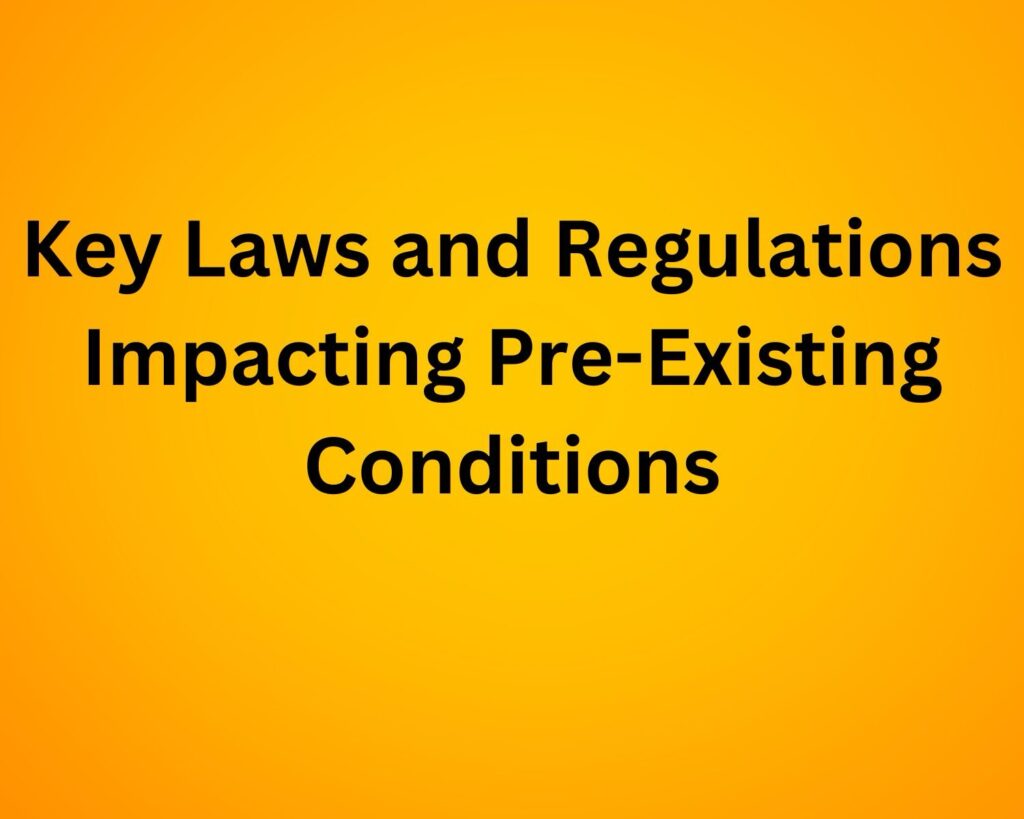In the complex world of healthcare, understanding your legal rights is not just empowering – it’s essential, particularly when navigating the challenges associated with pre-existing medical conditions. For many individuals, the interplay between health conditions and legal rights can seem daunting, often muddled by intricate policies and regulations. This article aims to demystify these complexities, offering clear insights and guidance on navigating your rights and protections under the law.

Pre-existing conditions, varying from chronic illnesses to past injuries, can significantly impact one’s healthcare journey. Historically, individuals with such conditions faced substantial challenges in obtaining fair health insurance coverage. However, with evolving laws and heightened awareness, the landscape is changing – bringing more rights and protections to patients. Understanding these legal aspects is not just about safeguarding against discrimination; it’s about ensuring you receive the healthcare and coverage you deserve.
In the following sections, we delve into what constitutes a pre-existing condition in legal terms, explore key laws that protect patients, and offer practical advice on navigating insurance policies and advocating for your rights. This knowledge is your tool to not only understand but also effectively manage the healthcare systems and policies that impact your life.

Understanding Pre-Existing Conditions in the Legal Context
When it comes to healthcare law, the term ‘pre-existing condition’ carries significant weight. Legally, a pre-existing condition refers to any health issue that an individual has been diagnosed with or received treatment for before enrolling in a new health insurance plan. This broad definition includes chronic illnesses, previous injuries, and even conditions that may not currently be active but have been part of your medical history.
The Evolution of Legal Interpretation
The legal interpretation of pre-existing conditions has evolved considerably over time. In the past, this definition allowed insurance companies to deny coverage or charge exorbitant premiums to those deemed ‘high-risk’ due to their health history. This practice often left many without necessary coverage or facing financial hardship. However, recent legal advancements have shifted this landscape, aiming to provide more equitable healthcare access.
Impact of the Legal Definition on Patient Rights
The legal definition of a pre-existing condition directly impacts patient rights. It determines eligibility for coverage, the kind of coverage you can receive, and the cost of your insurance premiums. Understanding this definition is crucial, as it helps in identifying your rights and protections under various health insurance policies and laws.
In the next section, we’ll explore the key laws and regulations that have a significant impact on the rights of individuals with pre-existing conditions, particularly focusing on the Affordable Care Act and other important legislations.
Insurance Solutions for Pre-Existing Medical Conditions: How to Get Approved

Key Laws and Regulations Impacting Pre-Existing Conditions
The legal landscape surrounding pre-existing conditions is largely shaped by several pivotal laws and regulations. Understanding these is key to comprehending the rights and protections you have as a patient.
The Affordable Care Act (ACA): A Game Changer
The Affordable Care Act (ACA), enacted in 2010, marked a significant turning point for individuals with pre-existing conditions. One of its core provisions prohibits health insurance companies from denying coverage or charging higher premiums based solely on a pre-existing condition. This act has enabled millions of Americans to access necessary healthcare that was previously out of reach due to cost or outright coverage denials.
State and Federal Laws Offering Additional Protections
Beyond the ACA, various state and federal laws offer additional protections. For instance, some states have their own regulations that further limit the ability of insurance companies to deny coverage. It’s important to research the specific laws in your state, as they can provide additional layers of protection and rights.
Laws Governing Employer-Sponsored Health Plans
If you receive health insurance through an employer, the Health Insurance Portability and Accountability Act (HIPAA) plays a crucial role. HIPAA limits the extent to which employer-sponsored group health plans can exclude coverage for pre-existing conditions. This act, combined with the ACA, provides a more comprehensive safety net for employees with health issues.
Medicare and Medicaid Considerations
For older adults and low-income individuals, understanding how Medicare and Medicaid treat pre-existing conditions is vital. These programs, governed by federal law, do not deny coverage based on pre-existing conditions, providing essential healthcare support to vulnerable populations.
The legal framework surrounding pre-existing conditions has been designed to ensure fair treatment and access to healthcare. It’s a dynamic area of law that continues to evolve, reflecting changes in societal values and political landscapes.
In the following section, we will discuss navigating insurance policies, focusing on the rights you hold and the protections against discriminatory practices.

Navigating Insurance Policies: Rights and Protections
When it comes to choosing and using health insurance policies, individuals with pre-existing conditions must be acutely aware of their rights and the protections afforded to them under the law. This knowledge can be instrumental in ensuring fair treatment and access to necessary healthcare.
Your Rights When Applying for Health Insurance
Under the ACA, you have the right to apply for and receive health insurance coverage regardless of any pre-existing conditions. Insurance companies cannot reject your application, charge you higher premiums, or impose excessive waiting periods due to your health history. Knowing this right is crucial when exploring insurance options or negotiating terms with insurance providers.
Protections Against Discrimination and Unfair Practices
Legal protections extend beyond the application process. The ACA also prohibits insurance companies from singling out individuals with pre-existing conditions for cancellation or reduced coverage once the policy is in effect. Additionally, you are protected against unfair practices like being charged higher rates than others in your demographic without valid reasons.
The Importance of Policy Renewals and Coverage Continuity
Understanding the terms related to policy renewals and coverage continuity is also vital. Insurers are generally required to renew policies as long as you continue to pay premiums, and they cannot alter your coverage terms based on changes in your health status. This ensures ongoing access to healthcare and protects against sudden loss of coverage.
Utilizing Legal Resources and Support Systems
Should you face challenges or disputes with your insurance provider, legal resources and support systems are available. From state insurance departments to consumer advocacy groups, numerous organizations can provide guidance and support in upholding your rights. Don’t hesitate to reach out to these entities if you encounter issues with your insurance coverage.
Navigating insurance policies with a pre-existing condition can be complex, but armed with knowledge of your rights and the legal protections in place, you can confidently advocate for yourself and ensure you receive the fair and comprehensive coverage you deserve.
Empowering Yourself with Legal Knowledge
Understanding the legal aspects and patient rights regarding pre-existing conditions is more than just a necessity — it’s a form of empowerment. By being informed about the laws and regulations that affect your healthcare, you can better navigate the insurance landscape, advocate for your needs, and secure the coverage you require.
The journey through the legalities of pre-existing conditions reveals a landscape that, while complex, is designed to protect and empower patients. Whether it’s comprehending the ACA, leveraging employer-sponsored plans, or advocating for your rights, the knowledge you gain is a powerful tool in managing your healthcare journey.
Stay informed, be proactive, and remember that your health and rights are paramount. With this mindset, navigating the healthcare system with a pre-existing condition becomes a journey of empowerment rather than one of uncertainty.
As an Amazon Associate we earn from qualifying purchases through some links in our articles.




